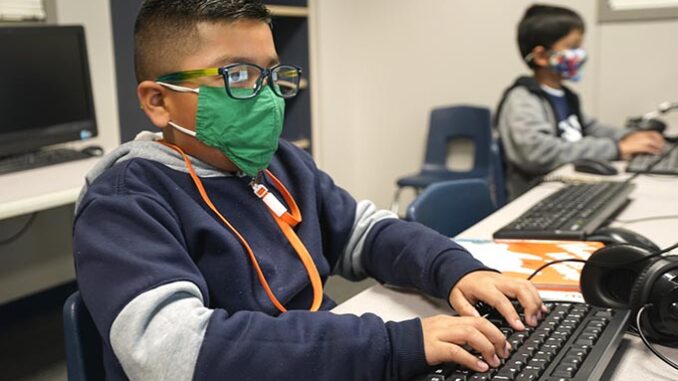
RALEIGH — Parents of students with disabilities and special needs in North Carolina say mandatory masking in schools is blocking their children’s learning recovery heading into much-needed summer-learning programs established by the legislature.
Jennifer Gupton, a mom with a son in the Franklin County Public School System, says her son cannot wear a mask and has been forced to learn virtually while other students have returned to in-person instruction.
“My son has been diagnosed with DD (developmentally delayed), ADHD, SPD (Sensory Processing Disorder),” Gupton told North State Journal. She added they are in the process of adding a possible anxiety disorder to the list.
Gupton said the district has refused to permit her son to go without a mask despite having a medical mask-exemption note from his doctor at Raleigh Neurology. She fears that her son will be relegated to virtual-only access to summer learning programs if this continues.
“My son has been learning virtually since March of 2020,” said Gupton. “With his specific disability and unique learning challenges, he needs in-person instruction. Each member of his educational support team agrees. However, the school district refuses to accept the fact that there are children whose disability will not allow them to wear a mask.”
According to Gupton, Franklin County Public Schools has denied that they are breaking “free appropriate public education” (FAPE) for students with disabilities — which is federal law. But Gupton says “they clearly are.”
Gupton’s son has an IEP (individualized education program), and that IEP has not been fulfilled by the school. She tells North State Journal her son should be receiving 20-minute sessions every nine weeks from occupational and speech therapists; however, during the 2020-2021 school year, he received exactly zero minutes of services. She also said the therapists were supposed to work with the family to set up time for services, but that hasn’t happened either.
As a result of the lack of in-person attendance, Gupton says her child, who had been flourishing at school before the lockdowns, has severely regressed and has very bad meltdowns.
“Their one-size-fits-all approach is outdated. In the meantime, my son, and other children like him, are being denied a fair and appropriate education,” Gupton added.
“It is my hope that my story will bring to light the challenges that these children face. That virtual learning does not work for everyone,” Gupton said. “We need to do better. Not just for my son and others like him but, for all of our children. Our future depends on it!”
North State Journal reached out to Franklin County Superintendent Rhonda Schuhler, asking why, if teachers were in the first vaccination group, and the governor, NCDHHS and DPI are all pointing to the same exemption language in official guidance, the district is refusing to grant mask exemptions to students who qualify for one and are already at a high-risk for learning loss as well as educational, emotional and physical regression.
In the request to Schuler, NSJ mentioned Executive Order 163 and the NC Dept. of Health and Human Services StrongSchoolsNC Toolkit, which says that individuals like these students “should not wear a face covering due to any medical or behavioral condition or disability (including, but not limited to, any person who has trouble breathing, or is unconscious or incapacitated, or is otherwise unable to put on or remove the face covering without assistance).”
“Our primary concern regarding implementation of masking requirements is the health and safety of all students in our care,” said Schuler in an email reply. “We have not opened the door to medical exemptions for masking, but have worked with families to pursue other accommodations that would provide students with appropriate access to instruction.”
Schuler went on to say that “Although staff were in an early vaccination group, students ages 12-15 have just recently become eligible to receive the vaccine, and the elementary age group is not yet eligible.”
“We have been in communication with Scott LaVigne, the Franklin County Health Department Director on this issue, and as of today he has continued concerns with low vaccination rates in Franklin County, coupled with high positivity rates, especially in the school aged category. With that in mind, pursuing an accommodation that would allow for a masking exemption is not being recommended by our local health department at this time,” Schuler wrote.
The Franklin County superintendent also said that they will “continue to monitor local metrics and state guidance, and will confer with our local health department to make informed decisions” and that the district will also “continue to work with families to explore other accommodations based upon individual student needs.”
When asked when to expand on the accommodations being pursued, Schuler wrote that “Accommodations are an IEP team decision based upon individual student need, so these vary.”
“In the case of options in lieu of masking, a variety of accommodations may be considered by the committee, up to and including virtual learning where masking is not feasible,” wrote Schuler.
Senate K-12 Education Committee Co-Chair Deanna Ballard (R-Watauga) said she thinks accommodations should be made for children like Mrs. Gupton’s son.
“I think it is cruel to make a child with special needs who has a doctor’s note saying he can’t wear a mask lose out on his schooling. Reasonable accommodations should be made, and that seems far from the case here,” Ballard told North State Journal. “While I have not spoken directly to the LEA, I am thankful parents continue to engage and fight for what is best for their children. Unfortunately, if this is happening at one school district, I’m sure it’s happening in other places.”




